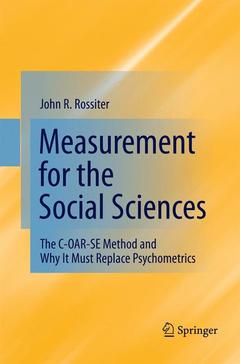Measurement for the Social Sciences, 2011 The C-OAR-SE Method and Why It Must Replace Psychometrics
Langue : Anglais

This book proposes a revolutionary new theory of construct measurement ? called C-OAR-SE ? for the social sciences. The acronym is derived from the following key elements: construct definition; object representation; attribute classification; rater entity identification; selection of item type; enumeration and scoring. The new theory is applicable to the design of measures of constructs in: ? Management ? Marketing ? Information Systems ? Organizational Behavior ? Psychology ? Sociology C-OAR-SE is a rationally rather than empirically-based theory and procedure. It can be used for designing measures of the most complex and also the most basic constructs that we use in social science research. C-OAR-SE is a radical alternative to the traditional empirically-based psychometric approach, and a considerable amount of the book?s content is devoted to demonstrating why the psychometric approach does not produce valid measures. The book argues that the psychometric approach has resulted in many misleading findings in the social sciences and has led to erroneous acceptance ? or rejection ? of many of our main theories and hypotheses, and that the C-OAR-SE approach to measurement would correct this massive problem. The main purpose of this book is to introduce and explain C-OAR-SE construct measurement theory in a way that will be understood by all social science researchers and that can be applied to designing new, more valid measures. Featuring numerous examples, practical applications, end-of-chapter questions, and appendices, the book will serve as an essential resource for students and professional researcher alike.
Ch 1. Rationale of C-OAR-SE.- Ch 2. Validity and reliability.- Ch 3. Object classification and measures.- Ch 4. Attribute classification and measures.- Ch 5. Rater entity classification.- Ch 6. Selection of item-type and answer scale.- Ch 7. Enumeration and scoring rule.- Ch 8. Qualitative research measurement.- Ch 9. DROAVR application checklist.- Appendix.- References.- Index.
John R. Rossiter (B.Psych.Hons., W.A.; M.Sc. Marketing, U.C.L.A.; Ph.D. Communications, Penn.) is a Research Professor in the Department of Management and Marketing, University of Wollongong, Australia, and also Visiting Professor of Marketing in the Institute for Brand and Communication Research, Bergische Universit�t Wuppertal, Germany. An expert in marketing communications and measurement theory, he has held full-time appointments at The Wharton School, University of Pennsylvania; the Graduate School of Business, Columbia University; the University of Technology, Sydney; and the Australian Graduate School of Management, University of New South Wales. Since the publication of his first advertising textbook in 1987, he has been the most-cited Australian marketing author. John Rossiter has co-authored six books and published more than 60 refereed journal articles. He has also for many years been a marketing research consultant to government organizations and commercial companies in the U.S., the U.K., and Australia.
Powerful critique of conventional methods of data analysis in the social sciences Expands on author’s seminal article and presents numerous examples and illustrations of the C-OAR-SE method Includes end-of-chapter questions/exercises to engage readers and includes appendices with additional material and resources for students and professionals Includes supplementary material: sn.pub/extras
Ouvrage de 169 p.
15.5x23.5 cm
Ouvrage de 169 p.
15.5x23.5 cm
Thèmes de Measurement for the Social Sciences :
© 2024 LAVOISIER S.A.S.


